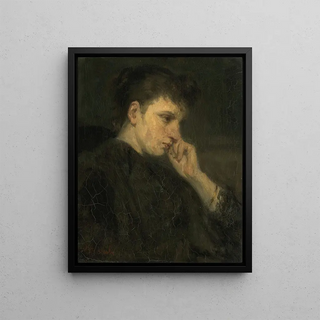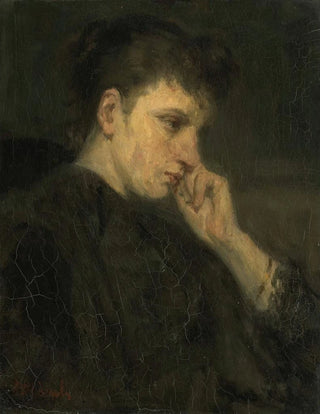Art print | Melancholy - Jozef Israëls Source: Reproduction | Mélancolie - Jozef Israëls


View from behind

Frame (optional)
Melancholy Art print - Jozef Israëls – Captivating introduction
The painting "Melancholy" by Jozef Israëls is a work that transcends the simple artistic frame to immerse the viewer in an ocean of deep and nuanced emotions. This canvas, imbued with melancholy, evokes solitude and contemplation, universal themes that resonate across time. Israëls, master of light and shadow, manages to capture fleeting moments of human existence, making this work of art with unparalleled evocative power. Through the art print of "Melancholy - Jozef Israëls," the viewer is invited to enter into a silent dialogue with the artist, to feel the emotional vibrations that each brushstroke infuses into the canvas.
Style and uniqueness of the work
Israëls' style is distinguished by a realistic approach, but also by an impressionist sensitivity that gives his works a unique atmosphere. In "Melancholy," dark colors intertwine with lighter shades, creating a striking contrast that draws the eye and stimulates the mind. The composition focuses on a solitary figure, immersed in introspective thoughts, while the surrounding environment seems almost to dissolve into a fog of nostalgia. The meticulous details of clothing and facial features testify to a deep respect for the human condition, while the use of light plays a fundamental role in visual storytelling. The work, in sum, is a true poetic momentum, an invitation to explore the meanders of the human soul.
The artist and his influence
Jozef Israëls, born in the Netherlands in the 19th century, is an emblematic figure of the realist movement. His career is marked by an incessant quest for truth and authenticity, values he has managed to transmit through his works. Influenced by masters such as Rembrandt, Israëls reinterpreted light and shadow to create atmospheres charged with emotion. His commitment to everyday life subjects, particularly those of the working classes, has helped give voice to stories often neglected. Through "

Matte finish

View from behind

Frame (optional)
Melancholy Art print - Jozef Israëls – Captivating introduction
The painting "Melancholy" by Jozef Israëls is a work that transcends the simple artistic frame to immerse the viewer in an ocean of deep and nuanced emotions. This canvas, imbued with melancholy, evokes solitude and contemplation, universal themes that resonate across time. Israëls, master of light and shadow, manages to capture fleeting moments of human existence, making this work of art with unparalleled evocative power. Through the art print of "Melancholy - Jozef Israëls," the viewer is invited to enter into a silent dialogue with the artist, to feel the emotional vibrations that each brushstroke infuses into the canvas.
Style and uniqueness of the work
Israëls' style is distinguished by a realistic approach, but also by an impressionist sensitivity that gives his works a unique atmosphere. In "Melancholy," dark colors intertwine with lighter shades, creating a striking contrast that draws the eye and stimulates the mind. The composition focuses on a solitary figure, immersed in introspective thoughts, while the surrounding environment seems almost to dissolve into a fog of nostalgia. The meticulous details of clothing and facial features testify to a deep respect for the human condition, while the use of light plays a fundamental role in visual storytelling. The work, in sum, is a true poetic momentum, an invitation to explore the meanders of the human soul.
The artist and his influence
Jozef Israëls, born in the Netherlands in the 19th century, is an emblematic figure of the realist movement. His career is marked by an incessant quest for truth and authenticity, values he has managed to transmit through his works. Influenced by masters such as Rembrandt, Israëls reinterpreted light and shadow to create atmospheres charged with emotion. His commitment to everyday life subjects, particularly those of the working classes, has helped give voice to stories often neglected. Through "






